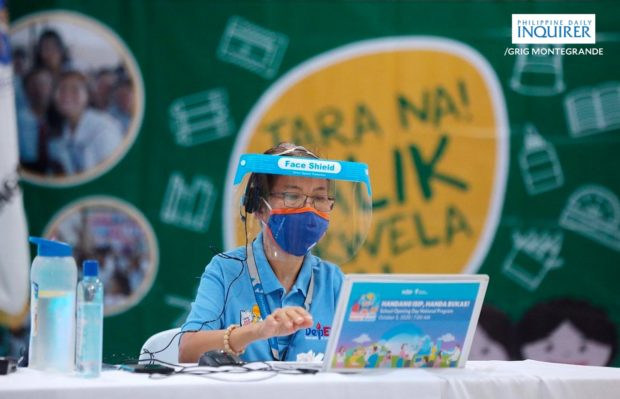IATF to convince Duterte to allow limited face-to-face classes
Public assistance personnel of the DepED Command Center located at DepED Central Office in Pasig City answer queries from stakeholders on Wednesday, Oct 7, ranging from enrollment procedures to learning modules clarification as the DepEd shifted to distance learning due to the coronavirus pandemic. INQUIRER/GRIG C. MONTEGRANDE
MANILA, Philippines — The Inter-Agency Task Force for the Management of Emerging Infectious Diseases (IATF), which manages the country’s COVID-19 pandemic, will again ask President Rodrigo Duterte to allow limited face-to-face classes in areas with low COVID-19 cases, Malacañang said Thursday.
The IATF had already approved “in principle” the preparation of a presentation to tackle the advantages of conducting in-person classes, presidential spokesperson Harry Roque said.
ADVERTISEMENT
“Ang masasabi ko lang po na talagang naghahanda po ng presentasyon ang ilang piling miyembro ng IATF para kay Presidente, para maipakita na iyong advantages ngayon na magsimula at least ang pilot, outweighs the disadvantages na hindi tayo nagpi-face to face,” Roque said in a press briefing.
Resignation of health workers hit St. Luke’s Medical Center
‘Unpleasant event’: Sara Duterte outs President Duterte, Bong Go’s 2022 plans
Presidential bid for Bongbong possible in 2022 – Imee Marcos
(All I can say is that members of the IATF are now preparing a presentation to show the President that the advantages of pilot face-to-face classes now outweighs the disadvantages.)
“The presentation should be made soon before the opening of classes in September and should help the President make the decision,” he added.
The
United Nations Children’s Fund
(Unicef) has said the Philippines is among the five countries that have not resumed in-person classes since the COVID-19 pandemic began. Other countries that have yet to reopen schools are Bangladesh, Kuwait, Saudi Arabia, and Venezuela.
Among the consequences of keeping schools closed, according to the Unicef, are “learning loss, mental distress, missed vaccinations, and heightened risk of dropout, child labor, and child marriage.”
In January, the President approved the conduct of
face-to-face classes pilot implementation
in low-risk areas, but recalled the decision due to the detection of new COVID-19 variants.
The
upcoming school year 2021-2022
, which will begin on
September 13
, will still be conducted through blended learning mode.
EDV
Subscribe to our daily newsletter
Read Next
15 more coal plant workers in Zambales test positive for COVID-19
EDITORS’ PICK
MOST READ
Don’t miss out on the latest news and information.
View comments



